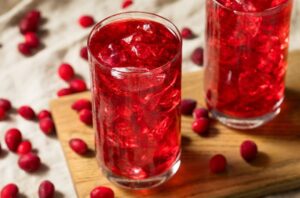A new study suggests that consuming whole cranberry powder can support healthy blood flow by mediating artery dilation.
Nutrition Facts
Fresh cranberries are nearly 90% water, but the rest is mostly carbs and fibre.
The main nutrients in 1 cup (100 grams) of raw, unsweetened cranberries are(https://fdc.nal.usda.gov/ndb/):
-
Calories: 46
-
Water: 87%
-
Protein: 0.4 grams
-
Carbs: 12.2 grams
-
Sugar: 4 grams
-
Fibre: 4.6 grams
-
Fat: 0.1 grams
New Study, Cranberry
A double-blind, randomised, controlled trial conducted by Heiss et al. (2022), published in Food & Function, investigated the vascular effects of freeze-dried whole cranberry consumption in healthy men. The trial involved 45 healthy male adults who were randomly allocated to one month daily consumption of either cranberry (nine grams of cranberry powder in water, providing 525 milligrams total polyphenols) or a control, providing powder with zero polyphenols. Tests on flow-mediated dilation, heart rate, blood pressure, blood lipids and blood glucose were measured at baseline on day one and after one month of consumption.
Researchers found that cranberry consumption significantly increased flow-mediated dilation, or the widening of arteries when blood flow increases. They also noted an increase in plasma and urine polyphenol metabolites.
Although there were no significant changes reported for heart rate and blood pressure, the trial concluded that acute and daily consumption of whole cranberry powder for one month can improve vascular function in healthy men and improve specific metabolite profiles in plasma.
Previous Studies
This adds to existing retrospective human studies (Ruel et al. 2006; Lee et al.2008; Ruel et al.2008; Basu et al.2011; Dohadwala et al. 2011 and Simao et al. 2013) which found that cranberry juice or extracts have proven beneficial for various heart disease risk factors and may help in:
-
increasing your levels of HDL (good) cholesterol
-
lowering levels of LDL (bad) cholesterol in people with diabetes
-
protecting LDL (bad) cholesterol from oxidation
-
decreasing stiffness in blood vessels among people with heart disease
-
lowering blood pressure
-
decreasing blood levels of homocysteine, thus cutting your risk of inflammation in blood vessels
Other Cranberry Benefits
Cranberries are one of the top antioxidant foods, and they contain an impressive collection of phytonutrients, including quercetin and anthocyanins. They are also a good source of vitamin C, manganese and other micronutrients.
In addition to their positive effects on vascular health, other cranberry benefits include:
-
Preventing and relieving UTIs
-
Reducing inflammation
-
Fighting free radical damage
-
Reducing the risk of certain cancers, including breast, lung, colon and prostate cancer
-
Boosting immune system function
-
Relieving digestive complaints
-
Reducing bloating
-
Reducing blood pressure
-
Increasing beneficial HDL cholesterol
Cranberry, Stomach Cancer and Ulcers
Cranberries contain unique plant compounds known as A-type proanthocyanidins, which may cut your risk of stomach cancer by preventing H. pylori from attaching to the lining of your stomach (Burger et al.2000; Shmuely et al. 2007; Gotteland et al. 2008; Matsushima et al.2008).
One study in 189 adults suggested that drinking 2.1 cups (500 ml) of cranberry juice daily may significantly reduce H. pylori infections (Zhang et al. 2005).
Another study in 295 children found that daily consumption of cranberry juice for 3 weeks suppressed the growth of H. pylori in about 17% of those infected (Gotteland et al. 2008)
Cranberry, Urinal Tract Infections
A number of human studies indicate that drinking cranberry juice or taking cranberry supplements may reduce the risk of UTIs in both children and adults(Kontiokari et al. 2001; Ferrara et al. 2009; McMurdo et a. 2009; Salo et al. 2011; Afshar et al. 2012).
Systematic reviews and meta-analyses support these findings, especially for women with recurrent UTIs( Jepson and Craig, 2008; Wang et al. 2012; Beerepoot et al. 2013)
Despite the positive effect on UTIs, a few studies have not found any significant benefits (Barbosa-Cesnik et al. 2011; McMurdo et al. 2005; Jepson et al. 2012).
That notwithstanding, Sánchez-Patán et al. (2012) is of the view that not all cranberry products are effective against UTIs. In fact, proanthocyanidins may be lost during processing, making them invisible in many products. On the other hand, cranberry supplements which contain enough amounts of A-type proanthocyanidins may be a useful preventive strategy. Take note that cranberries are not effective for treating infections. They only reduce your risk of getting them in the first place according to studies.
Kidney stones
High consumption of cranberries may increase the risk of kidney stones in predisposed individuals(Brinkley et al. 1981;Terris et al.2001; Gettman et al.2005). This notwithstanding, human studies have provided conflicting results and the issue requires further research (Terris et al. 2001; Gettman et al.2005). Vulnerability to developing kidney stones differs between individuals. In most people, cranberries probably do not significantly affect kidney stone formation. However, moderation is key.
Other Cardio Tips
-
Eat a balanced diet. Opt for healthy, anti-inflammatory foods, and reduce your consumption of sugary, processed and packaged foods. Some of the best choices include fresh fruits and vegetables, whole grains, legumes, nuts, seeds, herbs and high-quality, organic meat.
-
Exercise regularly. Moving your body regularly and getting your blood pumping supports cardiovascular health.
-
Reduce stress. Chronic stress leads to increased cortisol levels, which can cause inflammation and heart-related issues.
-
Get enough sleep. Aim for seven to nine hours of sleep every night for optimal health.
-
Don’t smoke. Studies show that smoking is a major risk factor for heart diseases.
-
Use supplements. Heart-healthy supplements include omega-3 fish oil, coenzyme Q10, curcumin and garlic.
Take Home
-
Heiss et al. (2022) double-blind, randomised, controlled trial published in Food & Function investigated the vascular effects of freeze-dried whole cranberry consumption in healthy men.
-
Heiss et al. (2022) found that consuming cranberry powder increased flow-mediated dilation, or the widening of arteries when blood flow increases. They also noted an increase in plasma and urine polyphenol metabolites.
-
Cranberry, if consumed regularly, may reduce your risk of stomach cancer. The juice and extract also improve several risk factors for heart disease, including cholesterol levels and blood pressure.
-
In addition to its benefits for vascular health, eating cranberries is also great for immune system function, preventing or treating UTIs, reducing inflammation and fighting free radical damage.











